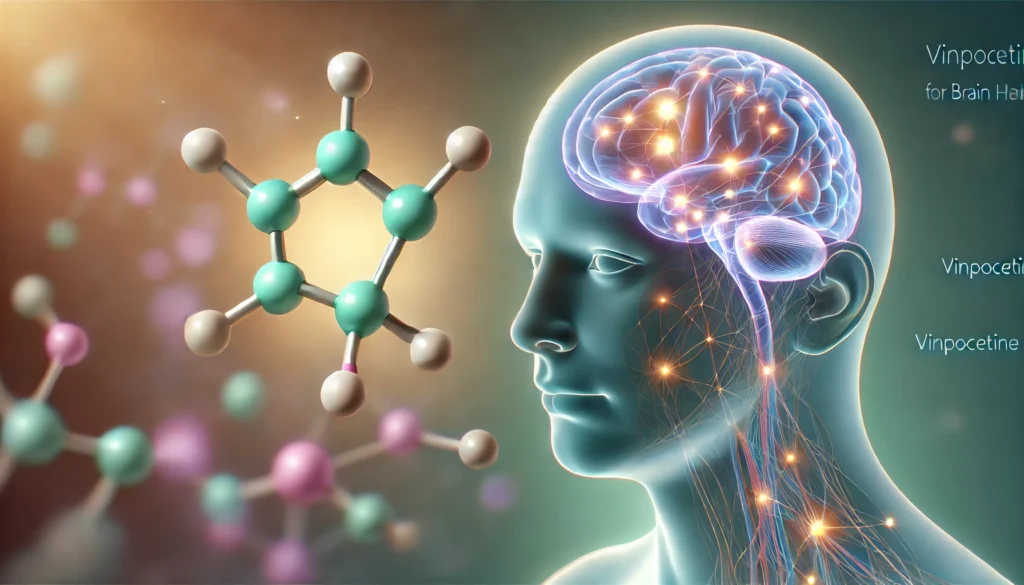Vinpocetine is a manufactured version of the periwinkle plant’s naturally occurring alkaloid vincamine (Vinca minor). Vinpocetine is a nootropic substance that was initially created in Hungary in the late 1970s. Its supporters laud vinpocetine’s potential to improve cognitive function, alertness, and focus. In order to help readers who are interested in using vinpocetine safely, this article will examine the nature of the supplement, the health advantages it provides, the ideal dosage to use, any potential side effects and interactions, and other relevant information.
You May Also Like:
Caffeine: Benefits, Dosage, Side Effects, Drug Interactions, And Other Important Information
Nature of Vinpocetine
Vinpocetine is a nootropic supplement made from the alkaloid vincamine, which is found naturally in the lesser periwinkle plant’s leaves (Vinca minor). Since ancient times, this plant has been utilized in traditional medicine, primarily for its alleged advantages for cerebral blood flow and cognitive function. Vinpocetine is a semisynthetic derivative of vincamine derived synthetically; more specifically, it is an ethyl ester of apovincamine. Vinpocetine is produced by a series of chemical reactions that result in a substance with greater potency and bioavailability than its parent molecule.
Vinpocetine is a lipophilic molecule that can easily penetrate the blood-brain barrier and is soluble in lipids. Because of this, it can have cognitive-improving effects on the central nervous system. This characteristic sets it apart from many other substances with alleged cognitive benefits and is necessary for it to function as a nootropic agent.
Health Benefits of Vinpocetine
Vinpocetine has been linked to several health advantages, most are connected to its capacity to improve cognitive function. Many of the benefits that have the most significant support include:
- Increased Memory and Learning: Numerous studies have shown vinpocetine to improve memory and learning in humans and animals. The regulation of neurotransmitter systems, particularly those involving acetylcholine, is thought to play a role in this impact.
- Improved Alertness and Focus: Vinpocetine has been demonstrated to enhance alertness and focus in healthy and cognitively impaired people. The substance’s ability to raise cerebral blood flow, supplying the brain with more oxygen and nutrients, and its interactions with neurotransmitter systems are likely the causes of this impact.
- Neuroprotection: As noted, vinpocetine protects neurons from damage by preventing the absorption of calcium, lowering the generation of ROS, and scavenging free radicals. This may aid in preventing neuronal death and damage that occur often in different neurological illnesses due to excitotoxicity or oxidative stress.
- Possible Therapy for Cognitive Impairments: Vinpocetine has been researched as a potential treatment for cognitive impairments linked to neurological conditions like Alzheimer’s disease and stroke because of its memory-improving and neuroprotective characteristics. Further studies are required to confirm vinpocetine’s efficacy in these situations, even if some studies have found beneficial outcomes.

Chemistry of Vinpocetine
Vinpocetine is a molecule with a distinctive structural makeup categorized as an ethyl ester of apovincamine, a semisynthetic vincamine derivative. It is thought that the bicyclic ring system of the chemical, which has an indole nucleus and a lactam moiety, contributes to its biological action. Ethyl (3,16)-eburnamenine-14-carboxylate is the scientific name for vinpocetine, and its molecular weight is 350.45 g/mol.
Physiological Mechanism of Action
Vinpocetine has a variety of modes of action that allow it to affect many facets of cognitive function. The following are some of the main mechanisms:
- Improvement in Cerebral Blood Flow: Vinpocetine is an effective vasodilator that relaxes blood vessels, improving blood flow to the brain. To achieve this, the enzyme that controls the intracellular levels of cyclic adenosine monophosphate (cAMP) and cyclic guanosine monophosphate, phosphodiesterase type 1 (PDE1), is inhibited (cGMP). The dilatation and enhanced cerebral blood flow caused by higher levels of these second messengers may improve the supply of oxygen and nutrients to neurons and hasten the removal of metabolic waste products.
- Neuroprotection: Vinpocetine has neuroprotective properties by preventing calcium uptake by neurons, lowering the generation of reactive oxygen species (ROS), and scavenging free radicals. These actions could aid in preventing neuronal death and damage that occur often in a variety of neurological illnesses due to excitotoxicity or oxidative stress.
- Modulation of Neurotransmitter Systems: Dopamine, serotonin, and acetylcholine-related neurotransmitter systems have all been identified to interact with vinpocetine. For instance, vinpocetine has been demonstrated to block dopamine reuptake, which may help to improve mood and cognitive function. Moreover, the substance has been shown to control acetylcholine release, a neurotransmitter essential for memory and learning.

Optimal Dosage of Vinpocetine
The ideal vinpocetine dosage can change depending on a person’s age, weight, and general health. Nevertheless, dosages ranging from 5 to 40 mg per day, split into two or three daily administrations, have been used in most investigations. Higher doses may suit people with neurological illnesses or cognitive impairments. In contrast, lower amounts, such as 5 to 10 mg per day, are often advised for healthy people seeking cognitive enhancement. When starting vinpocetine supplementation, it is crucial to speak with a healthcare provider because they can make individualized dosage recommendations based on your unique needs and health situation.
Side Effects of Vinpocetine
Vinpocetine is often well tolerated, and the majority of adverse effects are mild and temporary. Possible adverse effects include:
- Digestive problems: Some vinpocetine users have complained of nausea, stomach pain, and indigestion.
- Sleep issues: Insomnia and vivid nightmares have occasionally been observed, especially at larger doses.
- Hypotension: Vinpocetine is a vasodilator, so it may temporarily lower blood pressure, which may result in dizziness or lightheadedness in some people.
- Allergic reactions: Although uncommon, vinpocetine may cause allergic responses in certain people, with signs including rash, itching, and breathing difficulties.
If you encounter any severe or lingering adverse effects while using vinpocetine, it is imperative to stop using it and seek medical advice.
Potential Substance Interactions with Vinpocetine
Vinpocetine may interact with specific drugs or other substances, just like any dietary supplement. The following are some possible interactions to be mindful of:
- Anticoagulants and antiplatelet drugs: Vinpocetine’s vasodilatory effects may increase the risk of bleeding when combined with anticoagulants or antiplatelet drugs like warfarin, aspirin, or clopidogrel.
- Antihypertensive medications: Vinpocetine has a tendency to lower blood pressure, so it may intensify the effects of antihypertensive medications, resulting in abnormally low blood pressure.
- Drugs that depress the central nervous system (CNS), such as benzodiazepines, barbiturates, or alcohol, may have additive effects when used with vinpocetine, which could result in increased drowsiness or reduced cognitive function.
- Before mixing vinpocetine with any drugs or other supplements, it is imperative to speak with a healthcare provider to reduce the possibility of adverse reactions.
Vinpocetine: Conclusion
Vinpocetine is a valuable supplement that supports cognitive enhancement, neuroprotection, improved cerebral blood flow, stroke recovery, and prevention. It also exhibits anti-inflammatory and antioxidant effects. Its diverse benefits make it a helpful addition to natural health practices to maintain and improve brain health and cognitive function.
While vinpocetine offers these promising health benefits, it is essential to use it with caution. Individuals considering vinpocetine supplementation should consult with a healthcare professional, especially if they have underlying health conditions or are taking other medications, to avoid potential side effects and interactions.

References:
- Vinpocetine: Uses, Side Effects, Interactions, Dosage, and Warning. Retrieved from: https://www.webmd.com/vitamins/ai/ingredientmono-175/vinpocetine
- An update on Vinpocetine: New discoveries and clinical implications. Retrieved from: https://www.ncbi.nlm.nih.gov/pmc/articles/PMC5766389/
- Vinpocetine in Dietary Supplements. Retrieved from: https://www.fda.gov/food/information-select-dietary-supplement-ingredients-and-other-substances/vinpocetine-dietary-supplements
- Vinpocetine – Purported Benefits, Side Effects & More. Retrieved from: https://www.mskcc.org/cancer-care/integrative-medicine/herbs/vinpocetine
Important Note: The information contained in this article is for general informational purposes only, and should not be construed as health or medical advice, nor is it intended to diagnose, prevent, treat, or cure any disease or health condition. Before embarking on any diet, fitness regimen, or program of nutritional supplementation, it is advisable to consult your healthcare professional in order to determine its safety and probable efficacy in terms of your individual state of health.
Regarding Nutritional Supplements Or Other Non-Prescription Health Products: If any nutritional supplements or other non-prescription health products are mentioned in the foregoing article, any claims or statements made about them have not been evaluated by the U.S. Food and Drug Administration, and such nutritional supplements or other health products are not intended to diagnose, treat, cure, or prevent any disease.


